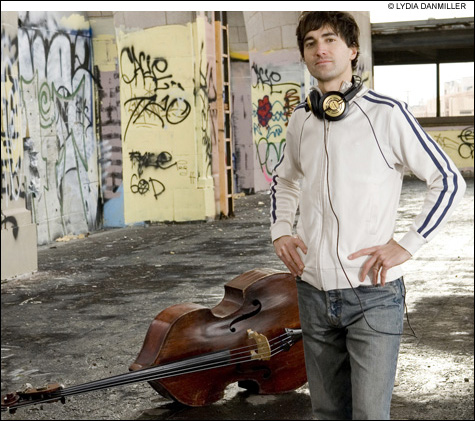
MASHUP MAN: DJ Masonic, a/k/a Mason Bates. |
DJ Masonic | October 5 at 7 pm | at SPACE Gallery, 538 Congress St, Portland | $5 | 207.828.5600
Portland Symphony Orchestra | October 7 at 7:30 pm | at Merrill Auditorium, 20 Myrtle St, Portland | $22-$75 | 207.842.0800 |
Electronica DJ Masonic, who will be performing October 5 at SPACE Gallery, has an alter ego. He is also classical music composer Mason Bates, whose ground-breaking work Liquid Interface will be performed by the Portland Symphony Orchestra in their season-opening concert on October 7 at Merrill Auditorium.
Bates, who hails from San Francisco, has managed to bridge the canyon between contemporary classical music and electronica, showing a glimpse into the future of classical music. At SPACE he will perform with the Improvisational String Quartet, which he describes as “ambient electronica interspersed with classical music.”
“I like bringing something totally different to the audience,” says Bates. “Music has always been about cross-genrization. Just look at Gershwin and how he used African rhythms in his music.”
Liquid Interface, commissioned by the National Symphony under Leonard Slatkin, is a powerful work inspired by the dramatic possibilities of water. Using the diverse sounds of the orchestra combined with his own electronic additions, Bates is able to explore all the forms of water.
“Each movement is getting warmer,” explains Bates. “I take the audience from glaciers to evaporation. It’s a water symphony for the 21st century.”
Bates claims that he is not trying to make a political statement with the work, but instead is using the familiar concept of climate change to express the different aspects of water.
Bates himself will be in the back of the symphony for the performance, adding his electronic stylings to the mix.
“I trigger various sounds, like the sound of a hurricane, and add groovy beats. It makes the piece more theatrical. It’s not a solo part. It’s more like I’m part of the percussion section. (Adding the synthesizer) makes it a super percussion section,” Bates explains.
“I really believe in (Bates),” says Portland Symphony music director Robert Moody. “Composers looking outside the box are the future of classical music.”
Both Moody and Bates agree that there is nothing on Earth quite like the sound of an orchestra. However, the concept of adding new instruments is certainly not a new one. Clarinets were not a common part of orchestras until Mozart began writing them into his scores. The tuba was not made popular in orchestras until the late 1800s.
And Bates is not the first to take advantage of electronic technology. Tapes and synthesizers have been utilized in classical music since the late ’60s, when the Carlos/Folkman duo released their album Switched On Bach, which included J.S. Bach’s works performed on a synthesizer.
“I think bringing a piece about water to a place where water is so important is perfect. (Moody) is bringing totally different stuff to the PSO. He’s very creative with his presentation, lighting and images, which are ripe for exploration,” says Bates.
As far as drawing young people into the Merrill Auditorium doors, Bates and Moody are both optimistic.
“The intimidation factor is hard for young people,” explains Bates.